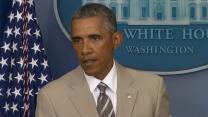Why Iowa? An up-close look at how the first-in-the-nation caucuses help to pick our presidents
Power Players
The Iowa caucuses are one of the greatest spectator sports in American politics.
As the first state in the nation to vote in the presidential nominating process, the Midwestern state is where rubber meets the road for candidates looking to make their White House dreams a reality. They converge on the state to make their sale directly to voters in the months before the caucuses.
Already this year, several possible 2016 hopefuls have made trips to Iowa, fueling speculation that they might run for president. Republican Sens. Ted Cruz, R-Texas, and Rand Paul, R-Kentucky, have each made several visits to the state this year, and Hillary Clinton is scheduled to make a trip there next month -- her first since losing the caucuses in 2008.
Filmmaker AJ Schnack has distilled the political spectacle that is the Iowa Caucuses into a documentary, “Caucus,” which chronicles the 2012 caucuses, and sat down with “Power Players” to discuss the film.
“Something that I came to appreciate was the amount of attention that people in Iowa give the process through the entire length of it, so it's not just folks showing up in the last two weeks,” Schnack said. “They will show up on a weird day in July to hear from a candidate, and they'll ask the kind of questions that candidates aren't expecting, and what I came to see was that candidates were actually learning how to run for president.”
Iowa is considered an early indicator for which presidential candidates will advance to the general election. But the caucuses have also come under criticism for not always being a reliable predictor.
In 2012, for instance, former Sen. Rick Santorum, R-Pennsylvania, surprised political observers when he captured a narrow victory over Mitt Romney in the Republican caucuses. That was after the state was initially incorrectly called for Romney, eliminating any sort of immediate victory bounce for Santorum. In spite of Santorum’s Iowa success story, which Schnack documented at length, he did not ultimately go on to capture his party’s nomination.
Still, Schnack defended Iowa’s role in the presidential nominating process as an important one.
“I don't think we should think of Iowa or New Hampshire as, I like to say, Golden Globes to the Oscars,” he said. “We shouldn't be thinking that they have to be a predictor and that Iowa doesn't matter if their winner doesn't win the nomination or the presidency.”
Some candidates in the past have made a calculated decision to skip Iowa altogether and go straight to the second state in line, New Hampshire. But Schnack said that strategy has yet to be proven viable.
“Rudy Giuliani, you look at other people who tried that strategy, I don't know how you get good at running at running for president if you don't put yourself through the process,” Schnack said. “[Jon] Huntsman, for example, skipping in 2011; there were people who would say, I would love to vote for Huntsman, but he doesn't come here and so I'm stuck with Romney.”
Iowa is also useful, Schnack said, for revealing candidates’ potential weaknesses early on in the process.
When it came to Romney, who ultimately won the GOP nomination in 2012 despite coming in second place in Iowa, Schnack said the problems that haunted him in the general election were already on full display in Iowa.
In the general election, Romney’s campaign was rocked by scandal when a leaked recording revealed Romney speaking disparagingly of the 47 percent of Americans who he claimed paid no income taxes and were reliant on the government. But Shnack pointed out that Romney was already talking about the 47 percent in Iowa.
“He was talking about the 47 percent as he does in our film, so it was something that he hadn't, sort of, learned,” Schnack said. “How people are able to talk about those issues that they might have some trouble with, certainly that's the sort of thing that keeps popping back up and it would prove to be trouble both in Iowa and elsewhere.”
To find out what Rick Santorum had to say about the film and hear how Schnack was first inspired to cover the Iowa caucuses, check out this episode of “Power Players.”
ABC News’ Richard Coolidge, Ali Dukakis, Gary Westphalen, Tom D’Annibale and Pat Glass contributed to this episode.











No comments:
Post a Comment